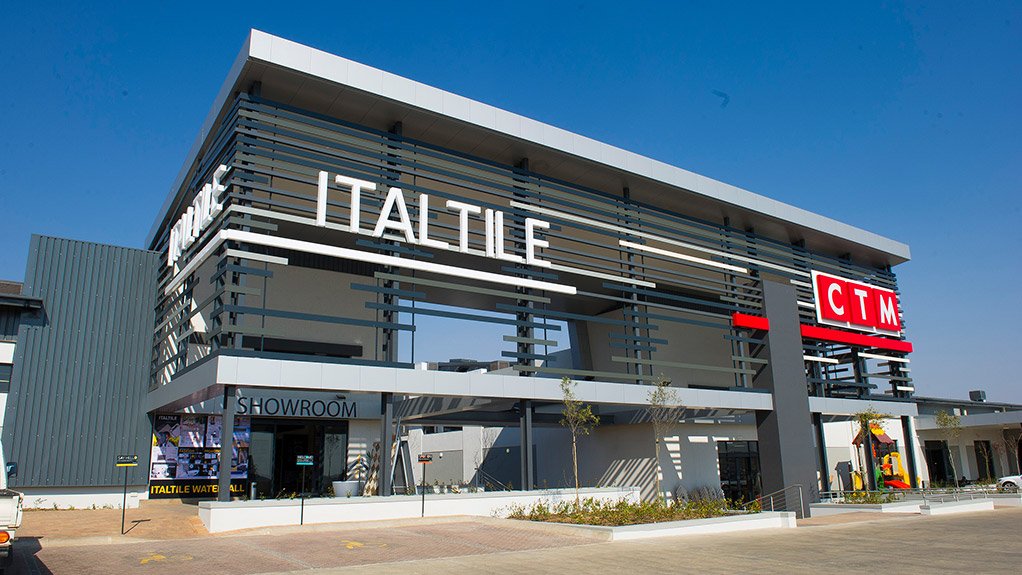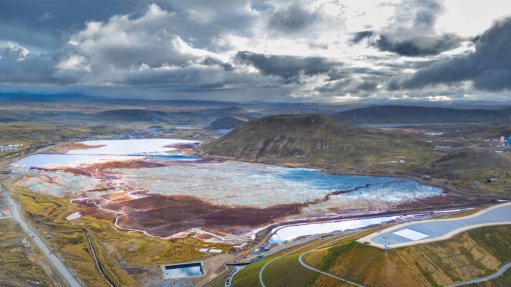Italtile attributes underwhelming results to manufacturing challenges
Tile company Italtile has delivered underwhelming results for the six months to December 31, 2022, with the group’s trading profit 8% lower year-on-year to R1.4-billion, while operating costs increased by 9% year-on-year.
“I think most disappointing for us really was the performance by our manufacturing division, which makes up about 40% of our group profits. Poor results in this division put a bit of a damper on our results,” Italtile CFO Brandon Wood told Engineering News on February 13.
He cited weaker demand, steep inflationary costs and production inefficiencies as the factors that impacted adversely on the manufacturing operations of Ceramic Industries and Ezee Tile during the reporting period, causing a dip in sales, profit and margin growth.
The combined manufacturing business contributed about 37% to total profit before tax. The poor results reported by these entities had a severe impact on Italtile’s overall performance for the period.
“The review period proved particularly difficult for Ceramic. The business is a volume-driven operation flourishing at full-capacity use and, therefore, the soft market demand and suboptimal capacity use had a significant effect on efficiencies, productivity and costs,” Wood explained.
Unrelenting loadshedding and power interruptions resulted in wastage and impacted on yields, damage to equipment and consequential maintenance costs, downtime impacting on productivity metrics, and opportunity costs resulting from the inability to timeously deliver product to customers.
In addition, input costs increased substantially during the period, he said.
“Management is confident that there are opportunities within the business that can be leveraged to improve productivity, efficiencies, profits and margins,” Italtile CEO Lance Foxcroft said.
However, he noted that, in the current testing economic climate featuring subdued demand, sustained price inflation, and ongoing – and possibly more severe – loadshedding, it is likely that profitability and margins will remain under pressure.
The Ezee Tile business also experienced a particularly tumultuous six months, reflected by the decrease in revenue, based on lower demand and the sharp decline in margins and profits, Wood said.
“Significant price increases and shortages of raw materials were major challenges, exacerbated by higher fuel prices and extensive delays caused by key suppliers and local authorities in relocating Ezee Tile’s primary factory to new owned premises in Vulcania, Gauteng,” Foxcroft added.
The new plant is expected to be in full production by the end of February, which will enable an improvement in performance and efficiency, he said.
“We are confident that there is significant upside to be derived from this restructured business,” said Foxcroft.
However, despite the operating challenges, Italtile still managed to achieve 3% year-on-year systemwide turnover growth from R6.1-billion to R6.2-billion, and also improved its underlying cash position by 51% from R500-million to R800-million, which Foxcroft said was underpinned by the company’s strategic, vertically integrated business model, diversification and scale.
“This affords us the resilience and agility to navigate cyclical challenges and capitalise on opportunities that arise,” he said.
The earnings per share (EPS) and headline earnings per share (HEPS) both dipped during the review period. EPS decreased by 5.4% to 79.5c, compared with 84c in 2021.
HEPS also decreased by 5.6% to 79.2c, compared with 83.9c in the previous year. The small difference between EPS and HEPS was the result of profits made from selling property, plant and equipment during the review period.
Foxcroft explained that the financial situation for homeowners during the review period remained challenging, causing a decrease in home renovation activity compared with the peak during the pandemic. Negative social and political factors further dampened consumer sentiment, leading to hesitation and a reduction in renovation and new construction projects.
Italtile's operations were also burdened by inflationary input costs, including a sharp rise in expenses such as fuel, raw materials, maintenance equipment and property.
Moreover, unexpected power outages and a breakdown in state energy infrastructure disrupted production and sales, negatively affecting efficiency and profitability.
Wood said Italtile generated about 7.5 MW of its own electricity across all of its manufacturing and retail businesses and was investigating the possibility of moving off-grid entirely wherever possible.
“The cost of supply and the detrimental impact of loadshedding and energy infrastructure failure on equipment and productivity, particularly in the manufacturing operations, continues to drive our aggressive pursuit of energy projects that will facilitate independence from the national grid,” Foxcroft said.
Key developments recorded during the interim period included the launch of Italtile’s second entirely off-grid store – CTM Protea Glen, in Gauteng – as well as the successful use of domestically extracted liquefied natural gas in Ceramic industries’ operations.
Further, Wood explained that additional solar capacity had been commissioned at Ceramic Industries’ Gryphon, Samca+ and Samca Wall factories and at Ezee Tile’s new facility at Vulcania, and that an investigation into implementing an electricity-wheeling arrangement had begun.
“Given greater certainty on gas pricing, we will also resume work on the group’s feasibility study regarding a combined heat and power programme,” Foxcroft explained.
Across the industry, foot traffic and transaction numbers declined to lower levels than prepandemic, which Wood said was largely a function of difficult economic conditions and unwinding of the pandemic-related home improvement boom.
He said the company was acutely aware of affordability of its products for its customers.
“Consumers are increasingly cost-conscious, reflected by a marked responsiveness to promotions and deals and the trend to buy-down in ancillary categories such as brassware, adhesives and sanitaryware. Accordingly, management focused on ensuring optimal price laddering and product mix to satisfy our customers’ expectations,” Foxcroft said.
He added that the company had prioritised the growth levers over which it had some measure of control and influence.
Among these were ongoing innovation and investment in delivering a positive shopping experience for customers through improved range, fashion, price and service, as well as improved productivity.
The revenue from Italtile’s stores and entities rose by 3% to R5-billion, compared with the previous year's revenue of R4.8-billion. The retail store turnover also saw growth of 2.4% compared with the previous year's interim period.
Excluding the sales of stores that were opened or closed during the current and previous periods, the like-for-like retail store turnover increased by 0.9%. Despite the lower sales volumes, the retail division performed better than expected, considering the prior period's results were positively impacted by the pandemic-driven home improvement boom.
The retail store turnover was positively influenced by a 7% price inflation compared with 8% in 2021.
Meanwhile, the period saw capital expenditure of R412-million incurred on completing long-standing large-scale projects, including Betta’s automated warehouse and the construction of Ezee Tile’s new Vulcania plant, as well as the starting of the Vitro factory’s production line upgrade, and construction of the group’s new multi-brand retail node in Walmer, Gqeberha, in the Eastern Cape.
"We anticipate that projected interest rate hikes and prevailing challenging economic conditions will intensify financial hardship and pressure on homeowners’ disposable income, and subdued demand and investor confidence is likely to persist in the short term. However, we will continue to focus on the growth levers within our control and influence,” Foxcroft said.
Article Enquiry
Email Article
Save Article
Feedback
To advertise email advertising@creamermedia.co.za or click here
Announcements
What's On
Subscribe to improve your user experience...
Option 1 (equivalent of R125 a month):
Receive a weekly copy of Creamer Media's Engineering News & Mining Weekly magazine
(print copy for those in South Africa and e-magazine for those outside of South Africa)
Receive daily email newsletters
Access to full search results
Access archive of magazine back copies
Access to Projects in Progress
Access to ONE Research Report of your choice in PDF format
Option 2 (equivalent of R375 a month):
All benefits from Option 1
PLUS
Access to Creamer Media's Research Channel Africa for ALL Research Reports, in PDF format, on various industrial and mining sectors
including Electricity; Water; Energy Transition; Hydrogen; Roads, Rail and Ports; Coal; Gold; Platinum; Battery Metals; etc.
Already a subscriber?
Forgotten your password?
Receive weekly copy of Creamer Media's Engineering News & Mining Weekly magazine (print copy for those in South Africa and e-magazine for those outside of South Africa)
➕
Recieve daily email newsletters
➕
Access to full search results
➕
Access archive of magazine back copies
➕
Access to Projects in Progress
➕
Access to ONE Research Report of your choice in PDF format
RESEARCH CHANNEL AFRICA
R4500 (equivalent of R375 a month)
SUBSCRIBEAll benefits from Option 1
➕
Access to Creamer Media's Research Channel Africa for ALL Research Reports on various industrial and mining sectors, in PDF format, including on:
Electricity
➕
Water
➕
Energy Transition
➕
Hydrogen
➕
Roads, Rail and Ports
➕
Coal
➕
Gold
➕
Platinum
➕
Battery Metals
➕
etc.
Receive all benefits from Option 1 or Option 2 delivered to numerous people at your company
➕
Multiple User names and Passwords for simultaneous log-ins
➕
Intranet integration access to all in your organisation





















